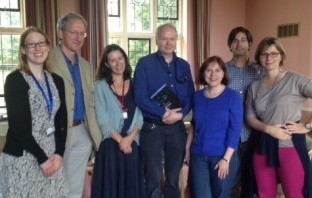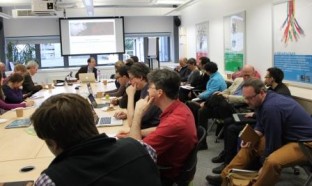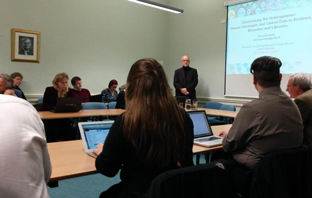Author: Lizzy Williamson, Project Manager
As the Faculty quietens after the rush of term, we wanted to take a moment to offer our thanks to those who have made 2014 so special, stimulating, and productive. At the same time, we’d like to give a brief update on the project and wish everyone a merry Christmas and a happy New Year!

Some of the core C of K team celebrating Dr Philip Beeley’s new book, volume III of The Correspondence of John Wallis (1616-1703), co-edited with Christoph J. Scriba
I’m delighted to announce that the current phase of the project has been extended to the end of March 2015 and that the New Year will see much of last year’s hard work being revealed to the public. First, we’ll be launching a new look for EMLO, coinciding with the launch of our first batch of new catalogues, on the Dutch golden age, containing cross-searchable metadata on over 20,000 early modern letters, before continuing with a rolling schedule of publications through the first quarter of 2015.
We are grateful for the strong support of the Andrew W Mellon Foundation through the first two phases of this project (Phase I: 2009–2012 and Phase II: Jan 2013 – March 2015) and are confident that the project is moving from strength to strength. Watch this space for details of future plans! As a sneak preview, in a third phase we would hope to tackle the problems of the semi-automation of metadata processing (very much to aid rather than to replace informed editorial decision-making) and of data-fusion issues, such as duplication, and to continue to develop our community of data-contributors and platform-users.

Our previous seminar series: Negotiating Networks, Six Case Studies.
I would like to give my heartfelt thanks to our team, from developers to editors, for their dedication and hard work over the last year. A special thank you must go to our interns and Digital Fellows too. Meet the whole team here! We’ve been blessed with the company of two excellent interns this year, who have split their time between working on the EMLO system and learning the ins and outs of what we do, and their own research. Marc Kolakowski joined us from Université de Lausanne and is writing his DPhil on Johann Wilhelm Stucki, funded by a Doctoral Mobility Study Grant from the Swiss National Science Foundation (FNS). Charlotte Marique was our first ever intern, joining us from Université de Liège, and she is embarking now upon a doctoral thesis on sixteenth-century Italian art and letters centred on the Florentine sculptor Baccio Bandinelli. Both have brought enthusiasm, dedication, wit, and warmth to the CofK offices this year. Our fantastic Digital Fellows have added to the cheerful bustle at CofK, whether working hard using our new webform to input fresh metadata, or reconciling to our own EMLO records people and places from contributed datasets.
Last month, we were host to the fantastic Dr Eetu Mäkelä, who visited under a COST STSM (or Short-Term Scientific Mission; a networking trip to me and you). Eetu is a computer scientist based at Aalto University in Finland and he spent three weeks getting to know EMLO and the team in order to help think through technical solutions to bulk data problems. Not one to waste time, he has already developed pilots of tools planned for our semi-automation and data-cleansing agendas proposed for the next phase of the project.

Last term’s seminar series. Photo taken by Tanya Gray Jones
All of us here at CofK wish to extend our thanks and best wishes to our growing number of contributors — from individual scholars to publishing houses. EMLO itself is a community of people volunteering to bring data together; our agenda is to facilitate this activity. Finally, we’d like to wish everyone a Very Merry Christmas and a Happy New Year! May 2015 bring you everything you hope for.

